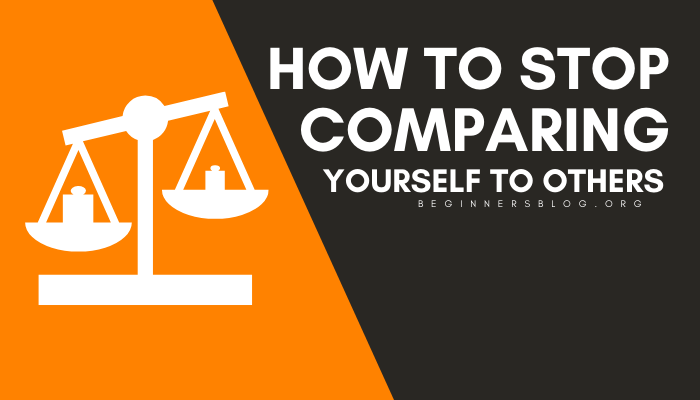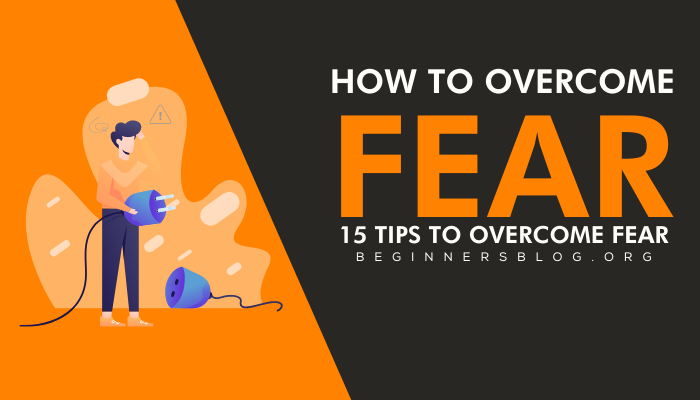How often do you compare yourself to other people? Are you constantly thinking about how much better they look or how richer they seem to be?
Somewhere I read, “When people compare and then feel depressed and demoralized, it’s often stemming from a belief that you’re not good enough.”
Comparison is a natural human tendency, and everyone compares themselves to others at some point in their lives. The problem arises when we compare ourselves to physically superior to ourselves, and this comparison can cause stress and anxiety.
When you compare yourself to others, you tend to focus on the negative aspects of your life. Instead of focusing on the positive things you’ve accomplished, you start to dwell on your failures. And always feel inferior.
The good news is that it’s easy to stop comparing yourself to others. You need to learn how to refocus your thoughts.
And In this post, I’m going to show you exactly how to stop comparing yourself to others.
Let’s jump into it…
What is Comparision?
According to Google.com, “Comparision is a consideration or estimate of the similarities or dissimilarities between two things or people.”
It is one of the most basic forms of self-evaluation. It helps us understand ourselves better by measuring ourselves against others. When we make comparisons, we tend to focus on the negative aspects of ourselves and others. This can lead to anxiety and depression. We need to get rid of these negative thoughts and feelings.
For example: If you’re driving down the road and see a car ahead of you, you might think, “Wow! this looks nice. It must have cost a lot of money.”
Or if you’re walking down the street and see another person wearing clothes that are nicer than yours, you might say, “I wish my clothes were as nice as those. They must cost a fortune.”
These examples illustrate the basic idea behind comparison. We look at something else and try to figure out whether it’s better than our own thing.
Why does comparison happen?
There are many reasons why we compare ourselves to others. Some of them include:
- One reason for comparison is status. People want to know where they stand in terms of social standing, and they want to know how successful they are compared to other people.
- Comparison is also driven by the fact that we all have different goals and aspirations. We all want to achieve certain things in life. But sometimes, we find it difficult to measure up to our expectations.
So, when you compare yourself to others and notice a gap, it’s important to realize that there will always be differences between you and others. That doesn’t mean that you’re less worthy or less capable, and it simply means that you’re unique.
Advantage & Disadvantage Of Comparision?
There are many benefits to making comparisons. For instance, it allows us to know what we don’t like about ourselves, and it also allows us to improve our weaknesses.
We can use comparisons to help motivate us to work harder. By looking at someone who has done more than we have, we can inspire improvement.
If you want to become a successful entrepreneur, you could benefit from comparisons. You can use comparisons to determine which areas of your business are working well and which ones aren’t.
You can also use comparisons to help you decide where you should invest your time and energy. For example, if you’re considering starting a new business, you could compare yourself to other entrepreneurs to determine whether you would be able to succeed.
In general, comparisons allow us to evaluate ourselves and others. It’s important to recognize both advantages and disadvantages to making comparisons. Let’s take a closer look at each side of the equation.
Advantages Of Making Comparisons
As mentioned earlier, comparisons give us information about ourselves and other people. Here are some ways they can be helpful:
1) Comparison motivates us to achieve goals
When we compare ourselves to others, we realize that we can never reach their level of success, which makes us motivated to keep trying.
2) Comparison provides motivation
We can feel inspired to pursue similar goals by seeing what others have accomplished.
3) Comparison helps us identify strengths and weaknesses
By comparing ourselves to others, we can discover our strengths and weaknesses. This knowledge will help us improve in the future.
4) Comparison helps us learn from mistakes
When we compare our successes and failures to others, we understand why certain things happened, which helps us avoid repeating the same mistake.
5) Comparison helps us develop new skills
By comparing ourselves with others, we can learn new skills. Once we’ve mastered these skills, we’ll no longer need to rely on others to tell us how to perform tasks.
6) Comparison helps us build relationships
By comparing ourselves and others, we get to know people who share common interests. In turn, we form friendships and partnerships.
7) Comparison helps us make decisions
When we compare two options, we can choose the one that offers greater value.
8) Comparison helps us understand life
Comparison is often used in religious ceremonies. For example, when Christians celebrate Christmas or Jewish observe Hanukkah, they compare themselves to Jesus Christ and the Maccabees, respectively.
Disadvantages Of Making Comparisons
While comparison can be beneficial, it can also be harmful. The following are some examples of situations in which comparison can lead to trouble:
1) Comparison leads to Jealousy & Envy
According to a recent research study, 75% of people reported feeling envious of someone in the last year.
Envy and Jealousy are closely related emotions. While envy focuses on a person’s lack of material wealth, Jealousy focuses on a person’s relationship status.
Both envy and Jealousy are negative emotions because they cause us to focus on something outside of ourselves, and they make us dissatisfied with our own lives and abilities.
Envy occurs when someone envies another person’s accomplishments. And Jealousy happens when someone envies someone else’s possessions.
2) Comparison leads to resentment
Resentment is an emotion that results from feeling unfairly treated. If you’re constantly comparing yourself to others, resentment may result.
3) Comparison leads to depression
Depression is an emotional state characterized by sadness and low self-esteem. This condition can occur if we constantly compare ourselves to others.
4) Comparison leads to anxiety
Anxiety is a mental health issue that involves fear and worries, and it can cause stress and discomfort. When we compare ourselves against others, anxiety can result.
5) Comparison leads to insecurity
Insecurity is an emotional state resulting from not being confident in your abilities. When we compare ourselves, insecurity can result.
6) Comparison leads to arrogance
Arrogance is an attitude of pridefulness and superiority. When we compare ourselves too much, we can become arrogant.
7) Comparison leads to failure
Failure is an outcome that occurs when we don’t achieve our goals. When we compare ourselves unfavorably with others, we risk failing.
8) Comparison leads to regret
Regret is an emotion that results when we realize something has gone wrong. When we compare ourselves negatively with others, we can experience regret.
9) Comparison leads to disappointment
Disappointment is an emotion that results after we fail to reach our expectations. When we compare ourselves favorably with others, we can feel disappointed.
10) Comparison leads to dissatisfaction
Dissatisfaction is an emotion that results because we aren’t fully satisfied with what we have. When we compare ourselves without limit, we can experience dissatisfaction.
11) Comparison leads to a lack of confidence
Lack of confidence is an emotional state that comes about when we doubt our capabilities. When we compare ourselves poorly, we can lose confidence.
So, you see, healthy comparison can help you improve the quality of your life. But the unhealthy comparison does affect your life negatively.
How To Stop Comparing Yourself To Others
What should you do when you notice that you’re making comparisons? How do you stop comparing yourself to others?
Here are a few tips that can help you stop comparing yourself to others.
1) Reframe Your Thoughts
When you compare yourself to others or focus on their success, it makes you feel bad about yourself, and you start thinking negatively about yourself. And this leads to low self-esteem.
The best way to overcome this problem is to change your perspective. Instead of focusing on what they have, focus on what you have. Think about what you’ve achieved so far and what you could achieve in the future. Focus on your strengths rather than weaknesses.
2) Change Your Attitude
The second step is to change your attitude towards yourself. Instead of feeling sorry for yourself, try to appreciate yourself. Appreciate your positive traits and characteristics. Try to acknowledge your accomplishments.
3) Practice Self-Compassion
It’s very important to learn to love yourself. When you make comparisons, you tend to put yourself down, which creates feelings of shame and guilt. The only way to get rid of these negative emotions is to practice self-compassion.
4) Focus On Your Strength Instead Of Weakness
As mentioned above, the comparison is closely linked to envy and Jealousy. So, it makes sense to focus on your strengths instead of weaknesses, which will help you avoid envy and Jealousy.
For example, if you’re good at art or music, you should focus on those areas. And you shouldn’t be envious of people who are better than you at sports or other things.
Remember, there’s no shame in having weaknesses. Everyone has them!
And you need to focus on your strength to stop comparing yourself to others.
5) Be Grateful For What You Have
When you compare yourself to others, you tend to think less of what you have and more of what others have. That’s why it’s important to be grateful for what you already have. This can help you overcome feelings of inadequacy and unworthiness.
You can start by listing all the blessings that you receive every day. Then, thank God for each one of them. You can even start writing down some of these blessings in a journal, which can help you develop gratitude.
6) Social Media is a Lie
Social media sites like Facebook, Instagram, and Twitter are great tools, and they give us access to information and connect us to people worldwide.
But they also lie to us. Because social media shows only a tiny fraction of someone else’s life, it doesn’t show their struggles and failures.
It also hides behind a veil of privacy. This means that we can never know exactly how much money another person earns, where they live, what kind of car they drive, etc.
You should never judge anyone based on social media posts. It doesn’t matter whether they’re skinny, fat, tall, short, rich, poor, etc.
So, don’t let social media fool you into thinking that you know everything about someone else.
7) Turn Comparision into Inspiration
Comparison can be very damaging. But it can also inspire you to achieve bigger and better things. If you want to stop comparing yourself to other people, you need to turn this tendency into inspiration.
Here are some examples:
– When you look at someone who looks successful, you may feel bad because you don’t look as successful as them. But you can use this feeling to motivate you to work harder and become successful.
– If you see an athlete winning a race, you may feel jealous. But you can use this feeling as motivation to train harder and win races too.
– If you watch a movie star walk down the street, you might feel upset because you wish you could look like her. But you can use this envy as inspiration to work hard to get fit and lose weight.
8) Admire Yourself
Admiration is the most powerful way to stop comparing yourself to everyone else.
The reason is admiration helps you appreciate your strengths and abilities. And when you admire yourself, you’ll always remember your greatness.
Moreover, admiration will make you feel good about yourself and boost your self-esteem. And if you feel good about yourself, you are less likely to compare yourself to others.
Research shows that people with high self-esteem are less likely to compare themselves to others. So, admire yourself, and you’ll stop comparing yourself to others!
9) Be Grateful
Gratitude is the best antidote to comparison. When you are thankful for what you have, you won’t feel bad about anything. You’ll feel so happy that you’ll be able to forget about any shortcomings or imperfections.
And when you aren’t focused on what you lack, you’ll be more open to new opportunities and experiences. This means that being grateful will help you stop comparing yourself to others.
10) Cheer For Others
Like I said, comparing yourself to others is natural, and we all do it from time to time. However, there is nothing wrong with cheering for others, and it’s healthy to cheer for others.
Cheering for others makes you happier than you would be otherwise. And happiness leads to positive emotions such as joy, gratitude, appreciation, love, compassion, empathy, hope, optimism, pride, contentment, and peace.
These positive emotions lead to increased positivity in your life. And these positive emotions keep you away from negative ones such as anger, Jealousy, sadness, fear, worry, regret, guilt, shame, and despair.
That’s why cheering for others is one of the best ways to stop comparing yourself to others by inspiring you to be more positive.
Conclusion
Comparison is unavoidable. It’s human nature. But we can control how much we compare ourselves to others.
We can choose to compare ourselves to those who are similar to us. Or we can choose to compare ourselves only to our goals and aspirations.
We can stop comparing ourselves to others and improve our lives by doing this.
I hope you’ve learned how to stop comparing yourself to others with this. Remember that everyone has different goals and aspirations. There will always be a gap between you and others. Don’t let this bother you. Instead, use it as motivation to work harder and strive for greatness.
If you’ve found this post helpful, please share it on social media platforms.
Do you have any questions? Leave a comment below. I would love to help you more!










